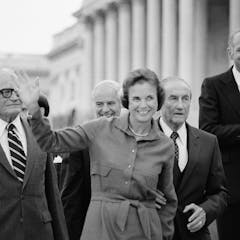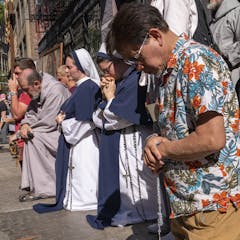
Articles on US Supreme Court
Displaying 41 - 60 of 672 articles

The US Supreme Court faces a case with huge repercussions for the 2024 presidential election – and American democracy. An election law scholar explains why.

As the nation approaches the 70-year anniversary of Brown vs. Board of Education, an education professor lays out the state of school segregation in America.

A law scholar examines a pair of Supreme Court cases that pit the public’s free speech rights against politicians’ rights.

The Constitution makes clear that a president who was impeached and convicted can still be prosecuted − but what about one who is acquitted in two impeachment trials?

Many countries wrestle with whether to include any kind of education about religion in public school lessons, and each one takes its own approach.

The first female justice on the Supreme Court was also the last justice to have served as an elected official. And her contributions to the court reflected her political experience and pragmatism.

This lawsuit is only the latest chapter in a battle between the state and the reproductive health care provider that heated up in 2011.

Without much scrutiny or fanfare, Edward Blum has led the attack against federal minority voter protection laws and the use of race in college admissions.

The Supreme Court will hear five cases this term that will examine the nature of online discussion spaces run by social media platforms.

The ruling could make it impossible for groups like the ACLU to file lawsuits to protect people’s right to vote – significantly changing how the Voting Rights Act has been interpreted so far.

An important tool in the fight against domestic violence is under scrutiny in a major US Supreme Court case.

An analysis of anti-abortion rights groups in the US shows that while some specifically turn to Christianity to explain their positions, others are looking at broader, human rights arguments.

Does Louisiana’s requirement for public schools to post ‘In God We Trust’ in all classrooms violate the doctrine of separation of church and state? A legal scholar weighs in.

An upcoming Supreme Court case that turns on race and party could affect how state legislatures shape voting maps and how Americans vote for decades to come.

Using the rhetoric of the First Amendment, a string of US Supreme Court cases has allowed members of some religious groups to limit the freedoms of other Americans.

Current precedent relies on a 1982 case in which five justices generally agreed there were limits on a school’s power to ban books, but they didn’t agree on why.

The ‘most divided’ Supreme Court ever may have been in 1941, when seven of the nine justices were New Deal supporters appointed by the same president, Franklin D. Roosevelt.

Since 2020, Alabama lawmakers have failed to draw political districts that give Black voters an equal chance of selecting political candidates that represent their interests.

The Supreme Court in recent terms has upended the interpretation of core laws. This term, the justices will decide just how far this revolution goes.

Only 50 years ago, originalism was considered a fringe movement, hardly taken seriously. Now its adherents dominate the Supreme Court.
